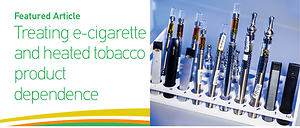Dear Editor,
There is strong evidence that any clear smoking cessation advice from healthcare professionals (e.g. physicians, nurses, dentists) can increase smokers’ motivation to quit1. Generally, guidelines for treating tobacco smoking dependence and supporting smoking cessation urge all health professionals to provide a minimum of brief smoking cessation advice to all patients, including current tobacco consumers to quit smoking and ex-smokers to avoid relapsing1,2. E-cigarettes and HTPs are continuing to gain popularity and acceptance by consumers worldwide3,4. However, many consumers and health professionals are uncertain about the potential benefits or adverse effects of these novel products5,6. Assessment of tobacco smoking dependence in medical practice does not usually consider e-cigarette or HTP dependence. To date, guidelines for treating tobacco dependence omit e-cigarette and HTP dependence, whose users, in any age group, may or may not be motivated to quit. We thus provide recommendations for incorporating the treatment of e-cigarette and HTP use dependence within guidelines for treating tobacco dependence and supporting smoking cessation.
The following aspects should be considered during the development of recommendations for treating e-cigarette and HTP dependence, in parallel to treating tobacco dependence guidelines. Minimal intervention or brief advice for cessation and the 5As strategy should also be tailored for e-cigarette and/or HTP users1,7,8. Thus, we recommend:
ASK and document all tobacco use, including novel nicotine delivery products (e-cigarettes and HTPs) current/former/never usage. Furthermore, exclusive e-cigarette/HTP or dual use (combustible tobacco product and e-cigarette and/or HTP use concomitantly) frequency and nicotine concentration of the e-liquid would also be valuable to record. Assessment of nicotine/cigarette dependence is routinely done in the clinical diagnosis of tobacco dependence. Several aspects of dependence overlap between nicotine containing e-cigarette and tobacco product use, however, beyond the presence of nicotine in the e-liquid, unique features of e-cigarette use such as flavorings and the device type may also contribute to dependence. Therefore, development of a short and psychometrically appropriate e-cigarette dependence measure for routine clinical assessment is needed.
ADVISE e-cigarette and/or HTP users to quit in a clear and personalized manner. Emphasize that novel tobacco product use is addictive, dual use should be avoided, and advise to quit completely.
ASSES readiness to quit e-cigarette and/or HTP use. For e-cigarette and/ or HTP users who are not motivated to quit, adaptation of brief motivational interviewing by using the 5Rs (Relevance, Risks, Rewards, Roadblocks, Repetition) strategy in smoking cessation counseling practice may also enhance motivation to quit. For e-cigarette and/or HTP users who are motivated to quit, health professionals should provide assistance in cessation. Studies on the effectiveness of motivational techniques enhancing e-cigarette and/or HTP users’ motivation to quit are needed.
ASSIST in cessation. For e-cigarette and/or HTP users who are ready to quit, health professionals should provide behavioral counseling and first-line cessation medications. Studies are needed to assess the effectiveness of behavioral counseling and first-line smoking cessation medications in cessation of novel products9. If a health professional is not a trained cessation counselor, the patient willing to quit should be referred to a smoking cessation/ quitline service. Novel cessation techniques like online cessation services and smartphone applications may also support cessation, but these need to be rigorously examined.
ARRANGE follow-up support. Monitoring the cessation process, adherence to behavioral and/ or pharmacotherapy and recording e-cigarette/ tobacco use status at each follow-up would also be useful. In-person, by phone and/or using novel techniques (online support, mobile apps) at follow-up could be appropriate, although these should be tested.
Finally, since the science of smoking cessation is still an evolving field, minor and comprehensive updates of cessation guidelines are regularly needed that should be based on the latest scientific evidence and best practices. National circumstances and priorities should be taken into account during the updates of national cessation strategies.


